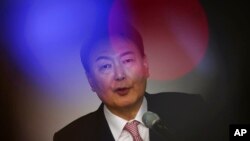Just three hours after being declared the winner of South Korea’s presidential election, conservative former prosecutor Yoon Suk-yeol was reminded of one of the peskiest foreign policy challenges he will face after taking office in May.
In a state media post early Thursday, North Korea offered the latest hint that it will soon launch a military spy satellite, a move that risks significantly raising tensions on the Korean Peninsula.
North Korean leader Kim Jong Un said the satellite will provide “real-time information” on the movements of “the aggression troops of the U.S. imperialism and its vassal forces” in the region, according to the state-run Korean Central News Agency.
The United States and its allies view North Korean satellite launches as thinly disguised tests of long-range missile technology banned by United Nations Security Council resolutions.
On Wednesday, the U.S. military announced it is stepping up intelligence and surveillance efforts near North Korea, and increasing readiness among its ballistic missile defense forces in the region.
“We have made clear what our concerns are, and we're acting on those concerns,” said Pentagon spokesperson John Kirby at a regular briefing.
U.S. intelligence officials believe North Korea could launch an intercontinental ballistic missile or conduct a nuclear test later this year, according to an assessment released earlier this week.
Either move could mean a return to tensions not seen since 2017, before Kim and former U.S. President Donald Trump engaged in a series of talks. Those discussions broke down in 2019, and North Korea has since increased missile testing.
Storm clouds ahead
In his first news conference Thursday as president-elect, Yoon promised to “sternly” address North Korean provocations, but insisted he is open to dialogue with Pyongyang.
It is looking increasingly like that dialogue will not happen anytime soon. So far this year, North Korea has launched 13 missiles during nine rounds of launches. The tests are seen as part of an effort to systematically work through a wish list of strategic weapons laid out by Kim last year.
“North Korea’s strategy for the time being, regardless of the outcome of the South Korean presidential election, is to focus on economic survival and making as much progress in its five-year defense development plan as possible until it is ready to return to talks with South Korea and the U.S.,” said Rachel Minyoung Lee, a Seoul-based Korea specialist at the Stimson Center.
Now seems an especially opportune time for North Korea to focus on that weapons development plan, said Lee. Not only is South Korea undergoing a leadership transition, U.S. diplomatic attention is focused on Russia’s war in Ukraine. Washington’s deteriorating ties with Beijing and Moscow could also factor in, she added.
“These dynamics make it extremely difficult for the international community to come up with a coordinated response to North Korea, which Kim Jong Un almost certainly understands and will use to his advantage,” Lee said.
Closer alignment with US
Yoon will succeed South Korean President Moon Jae-in, a left-leaning former human rights lawyer who relentlessly pursued diplomacy with North Korea, even amid rejections and insults from the North.
Yoon has called Moon’s outreach a “complete failure.” Instead, he has signaled he will prioritize the “complete and verifiable denuclearization” of North Korea – a position that will likely align him closer with U.S. President Joe Biden.
Yoon’s election will likely allow the Biden White House to “articulate its North Korea policy more clearly without fearing friction with Seoul,” said Go Myong-hyon, a research fellow at Seoul’s Asan Institute for Policy Studies.
Under Moon, the United States and South Korea sometimes struggled to align their positions toward the North. That was especially the case when it came to Moon’s call for an end-of-war declaration with North Korea, which many in the United States felt was premature.
U.S. officials have also sometimes offered more muted criticisms following North Korean missile launches, compared to their responses in the earlier period of Kim Jong’s rule.
“The Biden administration will be able to be more frank in its public comments (about North Korea) if deemed necessary because Yoon’s administration will want to call out North Korean violations and provocations as they are and respond in kind,” said Duyeon Kim, a Korea specialist at the Center for a New American Security.
Many analysts predict Yoon is likely to support the restoration of large-scale joint military exercises involving the South Korean and U.S. militaries. The drills had been scaled back in order to support diplomacy with Pyongyang and because of the coronavirus pandemic.
Yoon has also said he supports the deployment of a second U.S. missile defense battery, known as Terminal High Altitude Area Defense, or THAAD, which is meant to defend against North Korean missiles.
“All in all, this is a good result from Washington’s perspective,” said Ben Engel, Research Professor at the Institute of International Affairs at Seoul National University.
“Yoon has consistently taken positions which are in line with U.S. foreign policy, whether it’s taking a tough line on China or floating the idea of additional THAAD deployments. It seems probable that [South Korean] participation in multilateral venues like the Quad is more likely. And Yoon has promised to try and improve relations with Japan, which is in U.S. interests,” said Engel.
Looking beyond North Korea
Yoon is likely to continue Moon’s efforts to expand South Korea’s role in global affairs. As president, Moon significantly increased Seoul’s military budget and its major weapons development programs.
But those initiatives, Yoon insists, should have more than just North Korea in mind. In an editorial last month in Foreign Affairs magazine, Yoon called for South Korea to become a “global pivotal state.”
“Dealing with North Korea is an important task for any South Korean government. But it should not represent the whole of Seoul’s diplomacy,” Yoon wrote.
As Yoon prepares to take office, one of the big uncertainties is whether North Korea will allow him to focus his attention elsewhere.
